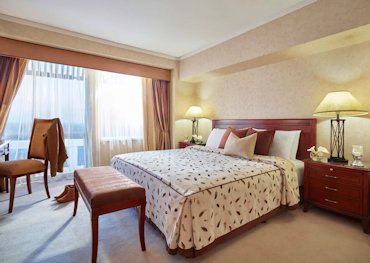Travel Notes: Africa - Zambia Travel Notes.
Short URL: https://tnot.es/ZM
Zambia Travel and Tourism on Travel Notes
Beyond The Falls - Explore and Discover the Enchanting Zambia
From the thundering Victoria Falls to the vast plains of the South Luangwa National Park, Zambia enchants its visitors with an authentic African experience. Share on Facebook
About Zambia
Formerly the British colony of Northern Rhodesia, Zambia has no access to the sea but many lakes.
The country is known for its diverse landscapes, including the Zambezi River, Victoria Falls (one of the largest waterfalls in the world), and the vast Luangwa Valley.
Countries neighbouring Zambia: Angola, Democratic Republic of the Congo, Tanzania, Malawi, Mozambique, Zimbabwe, Botswana and Namibia.
 Add a Business -
Add a Location -
Add a Lodging - Add Travel Content
- Add URL
- Travel Services.
Add a Business -
Add a Location -
Add a Lodging - Add Travel Content
- Add URL
- Travel Services.
Mapping Zambia
Map of Zambia
Visitors to Zambia can explore the South Luangwa and Kafue National Parks, and experience the spectacular Victoria Falls on the border with Zimbabwe.
The Zambezi flows through the western part of the country.
Zambia Overview
Zambia, a landlocked country located in southern Africa, shares borders with Tanzania to the north-east, Malawi to the east, Mozambique to the south-east, Zimbabwe to the south, Botswana and Namibia to the south-west, Angola to the west, and the Democratic Republic of the Congo to the north-west.
Despite its challenges, Zambia has made strides in development and continues to attract tourists and investors interested in its natural resources and growing economy.
Capital and Major Cities
The capital city of Zambia is Lusaka, located in the southern part of the country.
Other major cities include Ndola, Kitwe, and Livingstone.
Challenges
Like many African countries, Zambia faces various challenges, including poverty, unemployment, inadequate infrastructure, and healthcare issues.
Additionally, fluctuations in global copper prices can significantly impact the country's economy.
Culture and People
Zambia is home to over 70 ethnic groups, each with its own language, culture, and traditions.
The major ethnic groups include the Bemba, Tonga, Lozi, Nsenga, and Lunda.
English is the official language, but several indigenous languages are spoken throughout the country.
Traditional music, dance, and art are integral parts of Zambian culture.
Economy
Zambia's economy is largely dependent on copper mining, which is one of the country's major exports.
However, the country has been diversifying its economy to reduce its reliance on copper.
Other industries include agriculture (with maize being a staple crop), tourism (especially around Victoria Falls), and manufacturing.
History
Formerly known as Northern Rhodesia, Zambia gained independence from British colonial rule in 1964.
Kenneth Kaunda, the first president of Zambia, led the country through its formative years.
Political Landscape
Zambia is a democratic republic with a president as the head of state and government.
The country has experienced political stability since independence, with regular elections determining the leadership.
Wildlife
Zambia boasts a rich biodiversity and is known for its national parks and game reserves.
The country is a popular destination for safari enthusiasts, offering opportunities to see a wide variety of wildlife, including elephants, lions, leopards, rhinos, and numerous bird species.
Visiting Zambia
From breathtaking natural wonders to vibrant cultural encounters, a visit to Zambia offers plenty of travel experiences.
Remember to check visa requirements, especially if you're planning to visit multiple countries in the region.
Be mindful of safety precautions, especially when venturing into remote areas or engaging in adventurous activities in Zambia.
Zambia Highlights
Cultural Experiences
Zambia is home to various ethnic groups, each with its own traditions and customs.
You can visit local villages to learn about their way of life, participate in traditional ceremonies, and perhaps even try your hand at crafts like basket weaving.
Kafue National Park
Zambia's largest national park, Kafue is a wilderness paradise with diverse habitats, ranging from savannahs to wetlands.
It's an excellent destination for spotting predators like lions, cheetahs, and wild dogs, as well as an abundance of bird species.
Lake Kariba
Created by the damming of the Zambezi River, Lake Kariba is not only a scenic destination but also offers opportunities for fishing, boat cruises, and relaxing on the shores.
Livingstone
Named after the famous explorer David Livingstone, this town serves as the gateway to Victoria Falls.
Besides visiting the falls, you can enjoy activities like bungee jumping, zip-lining, white-water rafting, and microlight flights over the gorge.
Lower Zambezi National Park
Situated along the banks of the Zambezi River, the Lower Zambezi National Park boasts stunning landscapes and diverse wildlife.
You can go on game drives, boat safaris, or canoeing excursions, offering unique perspectives on the wildlife and scenery.
Lusaka
Zambia's capital city, Lusaka, offers a mix of urban amenities and cultural attractions.
Explore markets like Kabwata Cultural Village for handicrafts and local delicacies, or visit museums and art galleries to learn about Zambia's history and contemporary art scene.
South Luangwa National Park
Known for its incredible wildlife, South Luangwa National Park offers fantastic opportunities for safari adventures.
You can spot a wide array of animals, including elephants, lions, leopards, giraffes, and various antelope species.
Night drives are particularly thrilling for encountering nocturnal creatures.
Victoria Falls
Located on the Zambezi River, Victoria Falls (on the border with Zimbabwe) is one of the most iconic natural wonders in the world.
The sheer power and beauty of the falls are awe-inspiring, whether you're witnessing the cascades from viewpoints or taking a helicopter ride above them.
The People of Zambia
The Shona Bantu arrived in the area in the 12th century. The Karanga clan of the Shona later established the great empire of the Mwene Mutapa.
The Lunda and Lozi, from the Congo, moved in to the northern plains and upper Zambezi area during the 17th and 18th centuries.
In the next century, the Kololo, fleeing the Zulu crushing in South Africa, moved northwards and established a brief dominance over much of central and northern Zambia, before the Lozi imposed themselves again.
Chief Lewanika was the Lozi ruler when the British came to Barotseland.
The discovery of copper in the north led to the extension of the railway in the late 1920s.
Lusaka
Map of Lusaka
Located in south central Zambia, the capital of Zambia lies on a plateau at an altitude of 1,300m, giving it a pleasant temperate climate.
Lusaka was named after a local African leader, when founded in 1905 by European settlers.
In 1935 it replaced Livingstone as the capital of the British dependency of Northern Rhodesia, and became the capital of independent Zambia in 1964.
A railway connects Lusaka with Livingstone; for a visit to Victoria Falls.
Where to Stay in Lusaka
Taj Pamodzi Hotel
Taj Pamodzi Hotel: Corner of Addis Ababa Drive and Church Road, Lusaka, Zambia.
This five-star hotel in Lusaka may seem a little pricy but it's great value for money if you're ready to relax and treat yourself to a little luxury after months on the road.
Guests at the Taj Pamodzi Hotel rated the great food menu, great views and the level of service provided by staff.
Victoria Falls
Also called Mosi-Oa-Tunya, smoke that thunders, you can visit the thunderous spray of water from Livingstone, on Zambia's southern border with north-western Zimbabwe.
Where to Stay in Livingstone
The Royal Livingstone Hotel
The Royal Livingstone Hotel: Mosi-oa Tunya Road, Livingstone, Zambia.
Renowned for its colonial-inspired decor, this is an elegant and cosy five-star property in Livingstone with day spa, swimming pool and restaurants regally overlooking the mighty Victoria Falls.
Guests at The Royal Livingstone Hotel enjoyed the great breakfast, superb restaurant and impressive views.
Travel Around Zambia
Zambia by Air
Airlines and Airports:
Lusaka has an international airport.
Zambia by Rail
A line from Zimbabwe runs to Maramba, Lusaka, and Ndola; connecting with Zaire.
The Benguela Railway goes to the Atlantic coast of Angola.
The Tazara Railway, connecting Lusaka with Dar es-Salaam, in Tanzania, was built to provide the country with an alternative outlet during Angola's civil war.
Zambia by Road
The main towns of Zambia are connected by sealed road, but many rural roads become impassable during the rainy season.
Zambian Languages
The official language of Zambia is English, although more than 70 of the African languages are spoken in the country; principally Bemba, Lozi, Luvale, Tonga, and Nyanja.
Zambezi
The fourth longest river in Africa rises in north-western Zambia.
It flows through eastern Angola, and returns to traverse western Zambia; forming a border with north- eastern Botswana and northern Zimbabwe -- where it drops more than 120 metres as the Victoria Falls.
The Zambezi empties into the Indian Ocean through the Mozambique Channel.
Zambia Maps and Travel Guides
Zambia Travel Guides - Zambia Maps.
Weather in Africa:
Local weather forecasts for destinations around Africa.
|
|
More From Travel Notes
Travel Notes Online Guide to Travel
Africa - Asia - Caribbean - Europe - Middle East - North America - Oceania - South America.
The Travel Notes Online Guide to Travel helps visitors plan their trip with country and city travel guides, local tourist information, reviewed web sites, and inspiring travel content.
Travel and Tourism Guides on Travel Notes
 If you find Travel Notes useful, please take a moment to
like us on Facebook and share with your friends on social media.
If you find Travel Notes useful, please take a moment to
like us on Facebook and share with your friends on social media.
Share on Facebook
Travel Resources
.
Travel & Tourism With Industry Professionals.
















